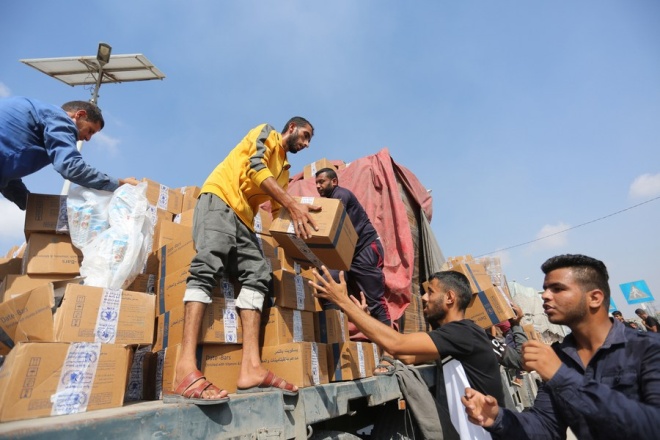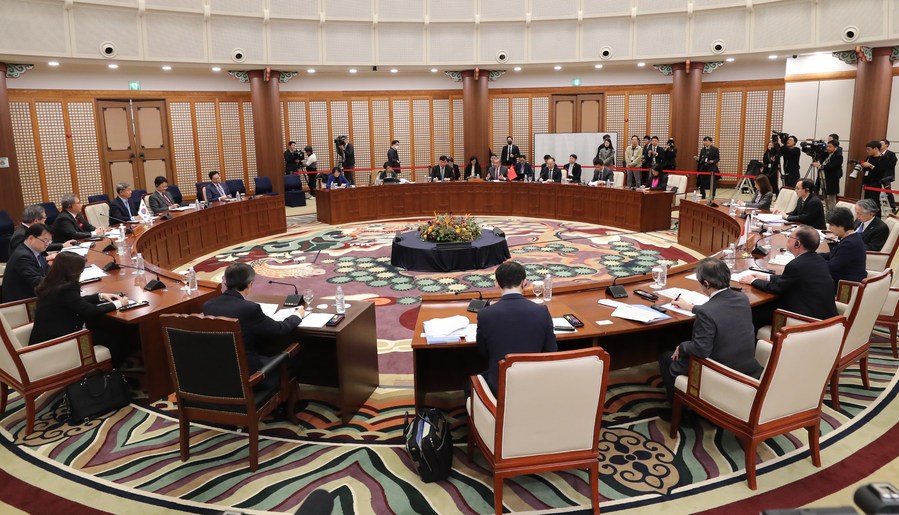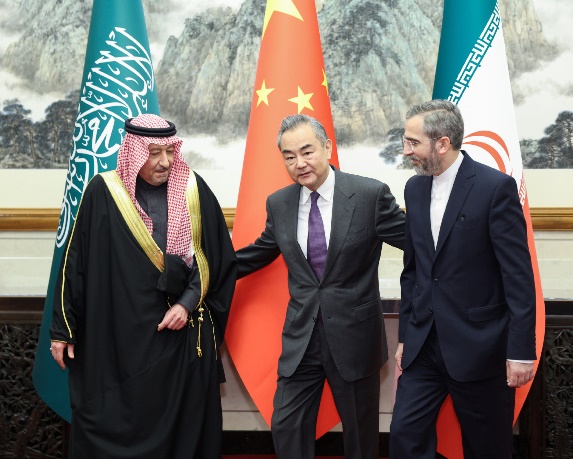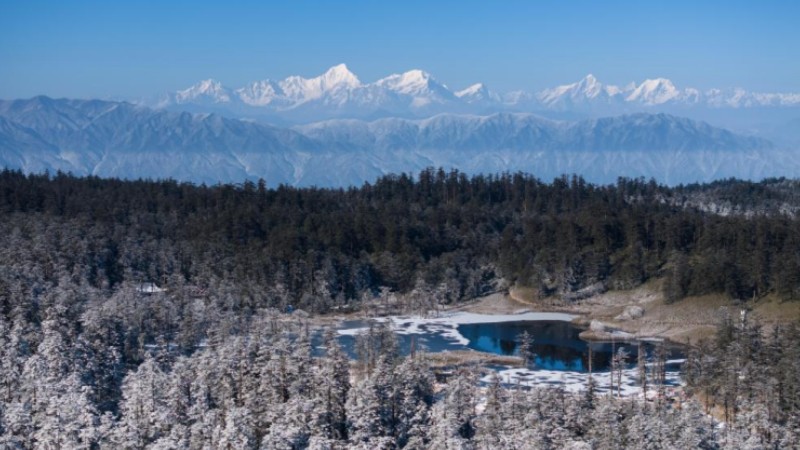Diplomatic hits and misses of 2023
Editor's Note: In 2023, there was a flurry of diplomatic activities around global hot spots. Here is a pick of major diplomatic gains and setbacks in the world.
Russia-Ukraine conflict comes to a gridlock

A damaged building hit by recent shelling is pictured in Donetsk, Dec 19, 2023. [Photo/Xinhua]
The Russia-Ukraine conflict, which began in February 2022, fell into a deadlock in 2023. Ukraine's summer counter-offensive failed to achieve a major breakthrough, and Russia announced a planned expansion of its armed forces.
Outside the battlefield, the US and EU are facing tough decisions on their aid package to Ukraine.
Since the Russia-Ukraine conflict broke out, the US has committed more than $44.2 billion in military aid to Ukraine, the Pentagon said in December. A Gallup poll released in November showed that 41 percent of Americans believed the US was doing too much to help Ukraine, a 12-percentage-point increase from 29 percent in June.
EU leaders at a December summit failed to agree on an additional 50-billion-euro ($54.63 billion) aid package to Ukraine. Prior to this, the bloc, having provided huge amounts in aid to Kyiv, has been widely criticized for its "double standards" in the Ukraine and Middle East conflicts.
NATO expansion sparks security concern

A sculpture and flags are seen at NATO headquarters in Brussels, Belgium, in this file photo taken on April 6, 2022. [Photo/Xinhua]
Finland officially became the 31st member of the NATO in April after winning approval from all member states. After the Russia-Ukraine conflict started in February 2022, Sweden and Finland submitted applications to join NATO in May 2022.
The NATO-Ukraine Council held its first meeting at the foreign ministers' level in November. According to the council, NATO and Ukraine are already working on a broad range of issues, including interoperability, energy security, innovation, cyber defense, and resilience.
Analysts caution that NATO's expansion and its responses to the Russia-Ukraine conflict could potentially jeopardize global security by triggering significant socioeconomic and political transformations.
Expansion of BRICS and G20

Electronic screens of the 15th BRICS Summit are seen at the O.R. Tambo International Airport in Johannesburg, South Africa, Aug 16, 2023. [Photo/Xinhua]
In August, BRICS, the grouping of major emerging economies of Brazil, Russia, India, China and South Africa, agreed to invite six additional countries — Argentina, Egypt, Ethiopia, Iran, Saudi Arabia, and the United Arab Emirates — to become full BRICS members on Jan 1, 2024.
The enlarged BRICS grouping represents more than 40 percent of the world's population, 25 percent of the global gross domestic product, and one-third of the planet's economic growth.
Similarly, G20 members granted permanent membership to the 55-member state group African Union in September.
The expansion of BRICS and G20 groups signifies that the Global South, comprising emerging market economies and developing countries, is striving to bring about transformative changes on the world stage, global observers say.
Israel-Hamas conflict

People unload humanitarian aid from a truck at the Rafah crossing in the southern Gaza Strip, on Nov 2, 2023. [Photo/Xinhua]
More than two months into the Israel-Hamas conflict, violence in the Middle East has no end in sight. The conflict, triggered by Hamas' surprise attack on southern Israel on Oct 7, is the deadliest in decades as it has killed more than 20,000 Palestinians and about 1,300 people in Israel.
A cease-fire between Israel and Hamas, initially lasting four days and gradually extended to a week, concluded on Dec 1. Israel subsequently restarted its attack and resumed the conflict that has resulted in extensive damage to Gaza and Hamas.
Integrated Food Security Phase Classification, a humanitarian organization backed by the UN, issued a report on Dec 21, warning that Gaza's entire 2.3 million population is at risk of famine due to the shortage of food caused by the Israeli siege.
International pressure is mounting for a new truce that could ramp up aid to the besieged Palestinian territory.
EU wrestles with migration crisis

This photo taken on Nov 21, 2023 shows migrants at a migrant reception center on Italy's southernmost island of Lampedusa. [Photo/Xinhua]
As the European Union is struggling to fix migrant plight, some of its member states have tightened their borders over the past few months. In November, France reinstated border controls and Germany has also introduced border checks.
Irregular crossings at the EU's external borders increased by 17 percent in the first 11 months of this year to over 355,300, surpassing full-year totals in any year since 2016, the European Border and Coast Guard Agency said. The bloc's 27 member states plus Norway and Switzerland are projected to receive over one million asylum applications in 2023.
The EU member states have been progressing with the long-stalled reform of a united migration policy, but given their divergent positions, the talks are lengthy and difficult.
Immigration has become the third rail of European politics, with October's informal EU summit in Granada, Spain, being an evident example, where the EU heads of state and governments failed to reach an agreement on addressing the pressing migration crisis.
Xi, Biden meet in San Francisco

President Xi Jinping meets with US President Joe Biden at Filoli Estate, US, Nov 15, 2023. [Photo/Xinhua]
President Xi Jinping met US President Joe Biden at the Filoli Estate in San Francisco in mid-November. This was Xi's first visit to the US in the past six years.
The trip is widely believed to have added stability to China-US relations, brought new impetus to the Asia-Pacific cooperation and injected positive energy into the international and regional landscape.
Xi-Biden summit reaffirmed their commitment to bilateral ties, especially by agreeing to 20 items of cooperation, including restoration of bilateral military-to-military ties, China-US inter-governmental dialogue on artificial intelligence, and reopening China-US dialogue and cooperation for controlling the spread of drugs.
China-Japan-ROK meeting

Foreign Minister Wang Yi, also a member of the Political Bureau of the Communist Party of China Central Committee, attends the tenth trilateral foreign ministers' meeting between China, Japan and the Republic of Korea with ROK Foreign Minister Park Jin and Japanese Foreign Minister Yoko Kamikawa in Busan, the ROK, Nov 26, 2023. [Photo/Xinhua]
Trilateral foreign ministers' meeting between China, Japan and the Republic of Korea was held in Busan, the ROK, in November. The meeting took place more than four years after the last such meeting in 2019.
Observers and officials noted that although the trilateral governmental dialogue mechanism has witnessed a slowdown in its progress over the four years, the three nations gave a push to the enactment of a 15-member free trade agreement that they signed up for — the Regional Comprehensive Economic Partnership.
At the meeting, the three sides agreed to create conditions for the China-Japan-ROK leaders' meeting and step up relevant preparations.
COP28 adopts first-ever deal on fossil fuels
The 28th session of the Conference of the Parties to the UN Framework Convention on Climate Change, or COP28, ended in December with the final text of the climate deal calling for "transitioning away from fossil fuels".
The agreement was unanimously approved by 198 nations. It marked the first time that firm action on fossil fuels has been agreed at a COP summit.
When the negotiations got stuck, China and the United States worked together, provided "some joint proposals to unlock the deadlock, and facilitated the success of the COP", said Xie Zhenhua, China's special envoy for climate change.
China and the US have released an agreement which addressed the national actions of the two countries, such as accelerating renewables and deployment to substitute for fossil fuels, said John Kerry, the US special presidential envoy for climate.
Saudi Arabia and Iran restore relations

Wang Yi, member of the Political Bureau of the Communist Party of China Central Committee and director of the Office of the Central Commission for Foreign Affairs, meets with Saudi Deputy Foreign Minister Waleed Elkhereiji and Iranian Deputy Foreign Minister for Political Affairs Ali Bagheri Kani in Beijing on Dec 15, 2023. [Photo/Xinhua]
In March, Saudi Arabia and Iran reached a deal, including the agreement to resume diplomatic relations, under the mediation of China. In December, the first vice-ministerial level meeting of the China-Saudi Arabia-Iran trilateral joint committee was held in Beijing.
All of these efforts were made to encourage regional countries to realize development through solidarity and resolve disputes and differences through dialogue and consultation, said Foreign Ministry spokesman Wang Wenbin, adding that China would like to work relentlessly to that end.
After the reconciliation between Saudi Arabia and Iran, a thaw in relations across the region, which had been prepared for over three years, suddenly accelerated. In April, Tunisia and Syria agreed to resume diplomatic ties, and Bahrain and Qatar agreed to resume ties the same month.
Photos
Related Stories
- Xi says mutual respect, peaceful coexistence and win-win cooperation right way for China, U.S. to get along
- Xi, Biden exchange congratulations on 45th anniversary of diplomatic ties
- Xi says China ready to join DPRK for greater development in ties
- Xi's 2024 New Year message highlights confidence, people, global vision
- Xi, Kim jointly designate 2024 as China-DPRK Friendship Year
- Xi calls on China, U.S. to promote stable, sustainable ties with concrete actions
Copyright © 2024 People's Daily Online. All Rights Reserved.









